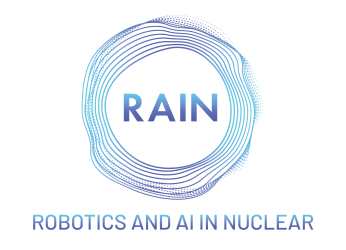12th April 2019 in Manchester


Workshop
This workshop explored the challenges of verifying autonomous robotic systems for use in the nuclear industry. It was held on the 12th of April 2019 in Manchester.
Groups of attendees discussed concrete nuclear robotic case studies, including how the introduction of autonomy, machine learning, or long-term use will impact the verification techniques and evidence required for certification. Representatives from the Office for Nuclear Regulation attended the workshop and provided useful feedback on the discussions.
Presentations
The workshop began with a recap of the role of the ONR in the nuclear industry. Then each of the four nuclear robotic system case studies was presented.
- Introduction to the ONR
- Steve Frost Office for Nuclear Regulation
- Download:
- MASCOT Case Study
- Robot Controlled Laser Cutting Case Study
- Laser/ Robot Remote Size Reduction Case Study
- Glovebox Operations Case Study
Discussions Session
The workshop had two discussion sessions, where discussion groups tackled one case study each.
The first group discussion session focussed on the current challenges and hazards of the case study.
Each group considered:
- the key hazards that a safety case for that system must account for,
- how to mitigate these hazards,
- what evidence can be provided for these mitigating factors, and;
- how we might constrain the system’s environment to improve or ease its safety.
The second group discussion session focussed on the hazards and challenges when autonomy is introduced into the case study.
Each group considered the impacts of:
- higher levels of autonomy,
- long-term autonomous systems,
- disposal or recovery at the robot’s end-of-life, and;
- adaptive or machine learning components.
Outcomes
Some preliminary ideas that came from the discussions were:
- relevant good practice for autonomy is still being developed,
- the benefits of autonomy in the nuclear sector still need to be justified,
- it may be advantageous to invite non-nuclear representatives to future events to help diversify the points of reference for robots and autonomy,
- a RAIN ‘principles’ document would be beneficial, to help frame thinking when considering robotic and autonomous systems, and;
- clear presentations of concrete problems from industry are very useful for the supply chain.
Workshop Report
A follow up report, summarising the interesting discussions from the workshop, is available for download: .
This report can be cited as:
M. Luckcuck, “Workshop Report: Scoping Certifiable Autonomous Nuclear Robotics” University of Liverpool, UK. ULCS-20-001. Jan, 2020. [Online]. https://intranet.csc.liv.ac.uk/research/techreports/tr2020/ulcs-20-001.pdf
Organisers
-
Michael Fisher – University of Liverpool, V&V of RAS Network, and RAIN Hub
-
Matt Luckcuck – University of Liverpool, RAIN Hub
Case Study Owners
- Sally Forbes, UK Atomic Energy Authority
- Howard Chapman, National Nuclear Laboratory
- Andy Melia, Sellafield Ltd
- Andrew Wallwork, Atomic Weapons Establishment